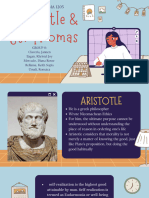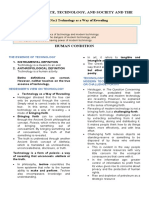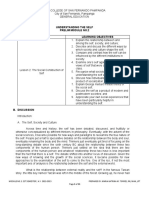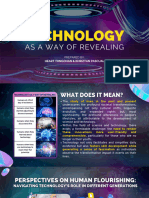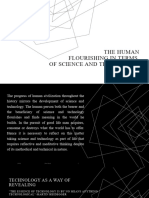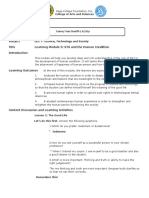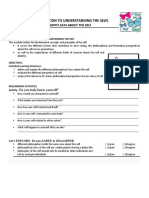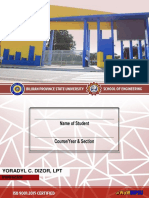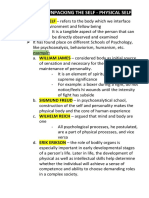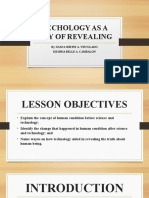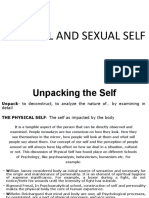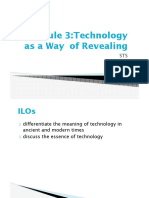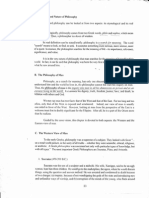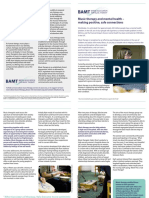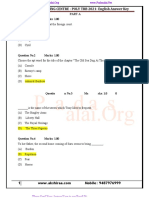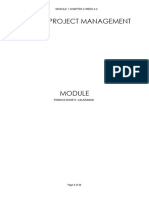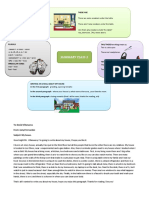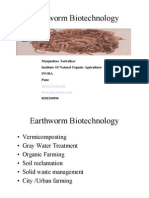Understanding the Self
Module 1
Introduction to Understanding the Self
Number of Sessions: Maximum of 2 hours.
Prepared by:
Noville E. Malugao, RPm.
Contact No.: 09489538385 email: gaonov.1798@gmail.com
� Introduction to Understanding the Self 2020
Module 1: Introduction to Understanding the Self
Module one is the first step toward the life-long journey of understanding self. It tackles the
fundamental concepts and principles of the self. It covers the different factors that contribute to one’s
being, the philosophical and theoretical perspectives about the self across generations, as well as the
explanations of different fields of sciences about the self and identity.
Module 1.1: Social, Environmental, and other Life Factors (S.E.L.F.)
Objectives:
1. Determine the different factors that contribute to one’s being;
2. Evaluate the impact of these factors through self-appraisal; and
3. Synthesize the influence of the factors of the self through individual
assessment
Module 1.2: Self in philosophical perspective
Objectives:
1. Discuss the different philosophical standpoints about self
2. Explain how philosophical models have transformed from classical to
contemporary views
3. Synthesize and evaluate the different perspectives of self and;
4. Analyze the relevance of various philosophical standpoints to your
sense of self.
5.Demonstrate critical and reflective thought in analyzing the development
of one’s self and identity by developing a theory of the self.
Module 1.3: Self in Scientific Perspective
Objectives
1. define and explain the different scientific standpoints about the self;
2. synthesize and evaluate these perspective of self; and
3. come up with a comprehensive definition of self according to scientific
standpoint.
4. compare and contrast how the self has been represented across the
different disciplines and perspectives
2|Page
� Introduction to Understanding the Self 2020
Module 1.1: Social, Environmental, and other Life Factors (S.E.L.F.)
Student, if you were asked to describe someone, how will you do it? Would you merely describe
the person based on his or her appearance? Would you describe them with their past? Would you
describe them with their skills and intelligence?
Look at the different perspective below and see how a person was describe and given meaning
of.
Nature vs. Nurture
Nature differs from Nurture, since in Nature, a person develops his/her characteristics
biologically (something that has developed starting from the birth of the child), while
in Nurture, a person develops his/her characteristics through the external factors, such
as the environment and the society (family, friends, relatives, etc.).
*Nature- blueprint of the self; hereditary(the transmission of traits and
characteristics from one generation to another); characterization(similarities
and differences); genetics
Arguments between Nature Vs Nurture are still unresolved.
Identity vs. Self
Identity, also, differs from Self, as what the readings say, Identities are “qualities,
characteristics, beliefs, opinions, etc., that make a person unique from others.” This is
what is distinguishable by others, or what they perceive to us through our actions. Self,
on the other had, is the “person of himself/herself,” meaning, it is what the others
didn’t see in you, because this is personal character; this is what makes up a person.
Identity- distinguishes or compares one from another;
Self-total characteristics or qualities of a person both known and unknown to
others.
According by OysermanElmore : “….identities make up one’s self concept
variously described as what comes to mind when one thinks of oneself.”
Dimensionalities of the Self/Identity
There are 4 different dimensionalities of self, namely social factor, environmental factor,
hereditary factor, and person-volition factor.
Social factors are the factors in the development of a person which includes all
the person around us, like our family members, relatives, friends, teachers or
3|Page
� Introduction to Understanding the Self 2020
professors, and even strangers, that might create an impression to you or
affects your actions and thoughts in life.
Family –Nursery of human nature.
The formation of personality –Personality is the individual patterns of
thinking, feeling and behaving.
Environmental factors are the factors in the development of a person that
includes the environmental structure, events, and such, which might give an
impact on how a person could grow in all the aspects of his/her life.
Hereditary factors are the factors in the development of the person that
includes biological changes and events, such as growth in height, puberty
(growing of pubic hair, deeper voices for male, broadening of hips and start of
menstruation for female, etc.) that usually affects the physical characteristics of
a person. Heredity is relatively fixed and permanent.
Person-volition factors are the inclination of a person creates a social construct
(beliefs, values and morals) which sets him apart to others.
REFLECTIVE QUESTION: WHICH OF THE FACTORS ABOVE CONTRIBUTE IN YOUR DEVELOPMENT AND
WHY?
LEARNING SUPPORT:
Educational Video: Watch https://youtu.be/k50yMwEOWGU
Create an essay regarding the video, following the same format.
Format for encoded output: Font Style: Arial
Font Size: 12
Spacing: 1.5
Margin: 1” Left and Right, 1” Top and Bottom
Page Size: 8.5” by 11”
Header: Must include the Name of the School, Address of the School,
College Department, Subject Description,
Write your name at the bottom of your essay.
Minimum of 200 words.
4|Page
� Introduction to Understanding the Self 2020
Module 1.2: Self in Philosophical Perspective
Self
o in philosophical perspective is define as, “a unified being, essentially connected to
consciousness, awareness, and agency(or, at least, with the faculty of rational choice).”
Classical Antiquity
Through Greek times:
o SOCRATES: Know Yourself
Greek philosophy was started by Socrates,
with his aphorism/principle of “know thyself,”
which is also inscribed in the temple of Apollo
at Delphi.
Socrates believed that the real self is not the
physical body, but rather the psyche (or soul).
o PLATO: The Ideal Self, the Perfect Self
Plato, a student of Socrates, also studied and
explained thoroughly what is the true essence
of self, which is then founded by his mentor.
Plato suggested that the “self is fundamentally
an intellectual entity whose nature exists
independent from physical world.”
o ARISTOTLE
Aristotle, student of Plato, explained
thoroughly how we could see the essence of
self. Aristotle suggested that the ideal is
subsumed in the phenomena. Aristotle called
the ideal as essence, and the phenomena as
the matter. He emphasized that these 2 co-
exist, and is dependent with one another.
Two lens of Philosophy of Self in Greek Times:
o Rationalism – explains self from the standpoint of what is ideal and true, and
what not is rooted with senses.
5|Page
� Introduction to Understanding the Self 2020
o Empiricism – according to it, there is no such thing as innate knowledge; all
knowledge are derived from experience – through five senses or what is
perceived by our brain.
Towards Modern Philosophy:
o Immanuel Kant: Respect for Self
empiricists philosopher
Man is the only creature who governs and directs himself and his
actions, who sets up for himself and his purpose, and who freely orders
means for the attainment of his aims. This rule is a plain dictum of
reason and justice: Respect others as you would respect yourself.
o Rene Descartes: I think, therefore I am (Cogito, ergo sum)
Self is a thinking entity distinct from the body. Although the mind and
the body are independent from each other and serve their own
function, man must use his own mind and thinking abilities to
investigate, analyze, experiment, and develop himself.
o John Locke: Personal Identity
empiricists philosopher
Personal identity(the self) is a matter of psychological continuity.
Personal identity is founded on consciousness (memory) and not on the
substance of either soul or the body.
Personal identity is the concept about oneself that evolves over the
course of an individual’s life.
o David Hume: The Self is the Bundle Theory of Mind
empiricists philosopher
Self is just the thing to which all perceptions of a man is ascribed.
Self is really just a bundle or collection of different perceptions which
succeed each other with an inconceivable rapidity.
o St. Augustine: Love and Justice as the Foundation of Individual Self
religious philosophy
Believes that a virtuous life is dynamism of love. It is a constant
following of and turning towards love while wicked life is a constant
turning away from love.
o Gilbert Ryle, Patricia Churchland, and Maurice Merleau-Ponty have
incorporated biological and neuroscience in their philosophies.
contemporary philosopher
Contemporary philosophers have incorporated science to their theories
in the light of the technological advancements that they have been
exposed to.
6|Page
� Introduction to Understanding the Self 2020
Module 1.3: Self in Scientific Perspective
Natural and social sciences encompass a number of disciplines that have deliberated on and
explained the concet and nature of the self.
Biological/Physiological Sciences
Neurophilosophy (attributed to Paul and Patricia Churchland) is concerned with the
association of the brain and the mind.
In order to understand the workings of the human mind, people must first
understand the brain, its functions, and wave activity.
Maurice Merleau-Ponty- who aimed to unite idealism with empiricism.
Psychoneuroimmunology describes the shaping of the self as similar to how the human
immune system functions.
Social Sciences
Psychology defined as the study of human behavior, sees the self as a theoretical
construct.
o Psychoanalysis (proposed by Sigmund Freud) focuses on the “unconscious” as a
core element of the self.
o Behaviorism maintains that the study of behavior should be made from an
observable and measurable perspective.
o Social Cognitive Theory considers behavior as a function of the environment
and internal attributes.
o Humanistic Perspective draws its assumptions from the observed criticisms of
psychoanalysis and behaviorism. It believes that every individual has the ability
to reach self-actualization and transcendence, and that each person is
inherently good or possesses something that is good.
Sociology is the study of the collective behavior of people within the society and focuses
on social problems encountered by individuals.
Anthropology is the study of human beings and their ancestors through time and space
and in relation to physical character, environmental and social relations, and culture.
Political Science (PolSci) is concerned with the participation of individuals in establishing
a government and making political choices.
Economics describes and analyzes the production, distribution, and consumption of
goods and services. Economic activities affect people’s value systems and sense of self.
7|Page


